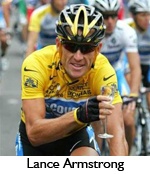 The Lance Armstrong Foundation has awarded a two-year, $543,808 grant to help establish the adolescent and young adult oncology program in the Oregon Health & Science University Cancer Institute.
The Lance Armstrong Foundation has awarded a two-year, $543,808 grant to help establish the adolescent and young adult oncology program in the Oregon Health & Science University Cancer Institute.
The state-of-the-art program will bolster contributions to national research and advocacy efforts for adolescent and young adult oncology and help accelerate the pace of improvement in cancer treatment for young adults, a population whose needs have long been overlooked.
"Young adults with cancer have unique needs often not encompassed by traditional pediatric and adult oncology practices," said Brandon Hayes-Lattin, M.D., who will serve as medical director for the adolescent and young adult program in the OHSU Cancer Institute.
The Lance Armstrong Foundation grant was made possible through funds raised in the 2005 Livestrong ride. Approximately 3,500 riders and 1,500 event volunteers joined seven-time Tour de France champion and cancer survivor Lance Armstrong for the inaugural ride, held last September at the Nike world headquarters in Beaverton. Proceeds from the ride also were dedicated to Lance Armstrong Foundation programs that help people living with cancer.
In 2006, the Livestrong challenge will be held in five communities, including Portland, between June and October. The signature fund-raising event of the Lance Armstrong Foundation provides a variety of opportunities for families and individuals to participate, including the original bike ride with 10-, 40-, 70- or 100-mile options; a 5K run/walk; and a 10K run. The Livestrong challenge will be held in Portland on July 30. Registration information is available at www.livestrong.org.
"The 2005 Livestrong ride in Portland was a fantastic event that embodied the spirit of what it is to be a cancer survivor," Hayes-Lattin said. "We at the OHSU Cancer Institute are deeply grateful to the cancer survivors, families, supporters and volunteers who made the ride possible and to the Lance Armstrong Foundation for this grant that will give us the opportunity to make a difference in the lives of many young cancer patients and survivors."
The OHSU Cancer Institute adolescent and young adult oncology program is one of the first programs of its kind in the nation. It will focus on developing and sharing more effective methods of diagnosing, treating, following and caring for people aged 15 to 40 who are diagnosed with cancer.
"We will focus on the medical, psychological and social issues facing people diagnosed with cancer during this transition-filled period of life," said Hayes-Lattin, whose passion about improving care and survivorship for young people with cancer developed when he himself was diagnosed with testicular cancer in his 20s. Today, he is a seven-year cancer survivor and, in addition to his clinical practice and leadership of the OHSU Cancer Institute's adolescent and young adult program, he serves as an assistant professor of medicine (hematology/medical oncology) in the OHSU School of Medicine.
"The need for change in how we care for young adults with cancer is great, but our knowledge is limited," Hayes-Lattin said.
Cancer is the leading disease killer among those aged 20 to 39. Approximately 65,000 adults in their 20s and 30s are diagnosed with cancer every year. They face a spectrum of cancers unique to their age group, and, in contrast to younger and older groups, the survival rates for patients aged 25 to 35 have not increased since 1975.
Young adults with cancer also have unmet needs specific to their age group that range from accessing quality cancer treatment and addressing fertility concerns, to managing complex psychological and social situations with caregivers, parents, peers and children at school as well as at work.
"We are determined to advance the knowledge and understanding of cancer survivorship within this age group," Hayes-Lattin said, who also serves on the organizing committee of the Livestrong Young Adult Alliance, a new program of the Lance Armstrong Foundation created to coordinate initiatives that improve survival rates and quality of life for young adults living with cancer.
Hayes-Lattin is the first adult medical oncologist to be appointed co-chair of the children's oncology group adolescent and young adult clinical trials subcommittee. He also recently served as a subcommittee co-chair of the National Cancer Institute's adolescent and young adult oncology progress review group and received one of two national AFLAC young investigator awards in adolescent and young adult oncology.
- Home
- News
- Opinion
- Entertainment
- Classified
- About Us
 MLK Breakfast
MLK Breakfast- Community
- Foundation
- Obituaries
- Donate
11-08-2024 6:59 am • PDX and SEA Weather














































































































































































































































































































